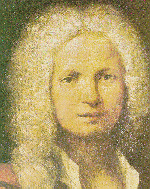
Antonio Vivaldi

(1678-1741)
Born in Venice, Vivaldi appears to have
been quite a remarkable character. He started learning the violin
at a very early age, being taught by his father and immediately
showing great promise, and later became one of the most
celebrated violinist/composers ever to have lived.
At the age of fifteen he started his training for the priesthood,
which took almost ten years to complete, and when finally he had
become a fully fledged priest, in 1703, he promptly decided to
give up saying mass, on the rather spurious grounds of ill
health. Apparently it was not uncommon for him to leave a service
in mid-celebration, complaining of chest pains, only to rush out
and scribble down a new tune for a concerto.
Although Vivaldi's main priorities were writing and performing
music, he retained an almost life-long association with one of
the major charitable institutions in Venice that was concerned
with looking after and educating young orphaned girls – of
which there were literally hundreds in Venice at the time. This
place, La Pietà, as it was known, was also to become something
of a mini-conservatoire of music. The children were educated with
a definite bias towards music, all taking lessons on string
instruments from Vivaldi and others. This led to numerous
concerts being given by the youngsters to a remarkably high
standard, which became something of a regular attraction in
Venice. Vivaldi played a major role in the preparation and
staging of these concerts and also brought in many other
well-known composers and musicians of the day to take part.
From 1703, aged twenty-five, he concentrated on composing music.
His first pieces were published a couple of years later, and he
embarked upon what turned out to be a highly successful and
rewarding career. Always travelling and extremely busy, Vivaldi
liked not only to compose the music but to take an active part in
rehearsing and conducting the performances as well.
He was an extremely prolific composer and during the period
between 1703 and his death in 1741 he wrote an astonishing 750
works, most of which are of exceptional quality. His most famous
work is that for violin and orchestra, The Four Seasons, and he
is, perhaps, best known for his pieces written in a similar vein
– the concertos for violin, guitar, bassoon and cello. There
are, in addition, forty-six operas listed in the catalogue
(although Vivaldi claimed to have written nearly a hundred, the
remaining fifty or so of which are now lost), scores of works for
miscellaneous wind instruments, trio sonatas, vocal pieces and a
whole host of small chamber works.